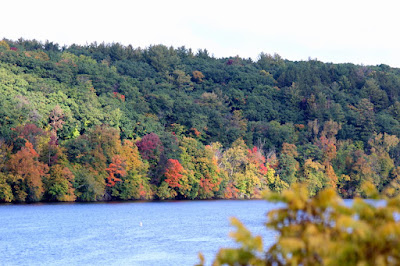Most of last night’s rain passed us by. We won’t know until about this time tomorrow if tonight’s weather will be a repeat. We get along nicely without thunder and lightning, especially SiSi, but we could use more rain. Last time I noticed, we’re about six inches short of “normal” for the year. Perhaps we’ll catch up with the forecast with a La Nina winter, which is usually cooler and wetter than normal around here.
One of these days I want to explore how we establish what’s “normal.” We know that the global climate has been warming for quite some time, but, per NOAA:
NCEI updates the Climate Normals every 10 years, in accordance with the World Meteorological Organization offsite link, which mandates that each of its member nations compute these 30-year averages and recommends an update each decade. The latest 1991–2020 U.S. Climate Normals are an update to the Normals for the previous 3 decades, 1981-2010.
However, lest we get concerned that regular updates will mask the effects of climate disruption:
To examine long-term climate change, NOAA uses the 20th-century average (1901-2000). If we compare the 1991-2020 annual temperature Normals to the 20th-century average, we see warming everywhere across the map. No region in the U.S. is cooler than it was during the 20th century, and much of the West and Northeast are one to two degrees warmer. The nation’s midsection — from the Gulf of Mexico to the Great Lakes — did not warm as much as other parts of the country due to a 5-to-15% increase in precipitation over the 20th-century average.
All of this has been prompted by my recent adventures exploring “shifting baselines.”
Coined by Daniel Pauly in 1995, while speaking of increasing tolerance to fish stock declines over generations, SBS also has roots in psychology, where it is referred to as ‘environmental generational amnesia’. Simply put, Shifting Baseline Syndrome is ‘a gradual change in the accepted norms for the condition of the natural environment due to a lack of experience, memory and/or knowledge of its past condition’. In this sense, what we consider to be a healthy environment now, past generations would consider to be degraded, and what we judge to be degraded now, the next generation will consider to be healthy or ‘normal’.
 |
| how many “persons” here?
Photo by J. Harrington
|
From my long ago course in fundamentals of ecology, I seem to recall that organisms can often adapt to change if the rate of change is more gradual. I doubt that will be of much help to our current cold water fisheries (trout and salmon in particular) as they encounter the stresses of climate change. And, if they were successful at adapting, would they still be what we know today as trout and salmon? We’re starting to get very close to questions such as “If a tree falls in the forest, and there’s no one there to hear it, does it make a sound?” The answer to that depends, among other things, on what we mean by “no one,” which, in turn, gets to the definition of who and what we consider persons.
Recognizing the rights of nature are modern expressions of long-practised Indigenous laws. Indigenous laws are as diverse as Indigenous cultures yet share an understanding that humans are an integral part of the natural world. These laws emphasize respect for all beings and responsibilities to care for lands and waters. Trees, mountains and plants are relatives, not commodities that can be privately owned and exploited.
Could it be that some baselines are shifting in a direction more positive for our home planet and all who live on it?
Personal History
This was in the year whena ship took leave of the water& floated out across the clouds.When the clouds becamethe opened palms of the angels.The year when the angels strungtheir wings across the telephone lineslike laundry drying in the sun.Only there was no sun.Not that year.That came later,when the children turned firstinto horses & then into ghosts,when the rain fell in lovewith a poet,when the poet forgot his own name& then the names for everything else.That was a good year.A year without names.A year when I learned to kneelwithout my knees ever touching the ground,& where the gods all prayed to us.But I am getting ahead of myself.I should start at the beginning.
********************************************
Thanks for visiting. Come again when you can.
Please be kind to each other while you can.
No comments:
Post a Comment